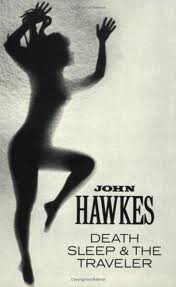Hawkes, John (1974). Death, Sleep, & the Traveler. New York: New Directions.
I ran across several references to Hawkes’ novels as “literary mysteries,” and I’m interested in that, so I took a look at two of his short novels (typically under 200 pages). The Beetle Leg (1951), a sort of western, was so stultifying I couldn’t finish it. But this one, Death, Sleep, & the Traveler (1974), held my interest, maybe because it is mainly about sex.
Main character Allert (accent on the first syllable) is a large, overweight, middle-aged Dutchman who lives with his younger, beautiful wife, Ursula. What attraction she sees in him is unknown. Their neighbor, Peter, a psychiatrist and trim, younger man, is attracted to Ursula, and Allert likes to watch the two of them have sex, on the living room floor. He has no particular feelings about it. But for Peter, Allert and Ursula having sex seems to make him jealous. Ursula is indifferent to everything.
The sexual scenes are explicit, but indirect, described modestly, using euphemisms for body parts and so on, so it is not pornography. The focus is on the psychologies of the three characters. And what is that psychology? I would say, “numb.” Allert and Ursula especially, seem disconnected, almost zombie-like. They have no lives beyond their hypersexuality, and they don’t even care about that.
Ursula says to Peter, “For you and me,” Ursula said quickly, though in a mild and somewhat unthinking voice, “…pornography would be intolerable. You and I do not filter life through fantasy. But it is otherwise with Allert. You cannot tear him away from a picture of a bare arm, let alone an entire and explicit scene of eroticism” (p. 150).
Notice that Ursula speaks only in a mild and unthinking voice, whatever that is. Even when she expresses a rare opinion about anything, she is distant, bloodless, not entirely present even to herself. Her idea seems to be that sex is just meaningless sex, so pornography is a pointless fantasy.
But she is right about Allert, who is the first-person narrator of the novel. Via his musings, we know that he does find sex in some way exciting and fascinating, though exactly why, or in what way, we never quite learn. Certainly it is not through any lens of possessiveness, for he has not a shred of jealousy in him. He too, seems numb, to sex, and to life itself, but perhaps slightly less so than Ursula, since he is at least interested in sex.
Allert muses, “To me, it has always been curious that Peter, who never married, should have lived a life that was unconditionally monogamous, thanks to the power of Ursula’s dark allure and her strength of mind, whereas I, who became married to Ursula…have lived my life as sexually free as the arctic wind. …But during all this time I have thought of myself as moderate, slow-paced, sensible, overly large, aging. But ordinary, always ordinary…Ursula must have thought of me as a Dutch husband who had been lobotomized – but imperfectly” (pp 134-135).
Sexually free as the arctic wind! Free, but forever cold, not passionate, blowing over a bleak terrain. All three of the main characters have this detached attitude toward sex, attitudes that would not be shared by most readers, and that’s what makes them interesting.
As the perfunctory story develops, Ursula becomes bored with Allert and vows to leave him. Allert goes alone on a cruise, and on-board, strikes up a sexual relationship with a much younger woman, a girl really, and that develops into another three-way with an obnoxious ship’s officer. But somehow, we gather through comments and snippets, the young girl apparently went overboard and died. Allert was implicated in her death, and questioned, but exonerated. The death occurs entirely off page, and we never learn what actually happened. So much for the murder mystery plot.
Time is cut up so severely, the present mixed with the past, that it is next to impossible to discern any narrative thread. Allert’s dreams are also intercut, along with brief images and aphorisms, to create a woozy, kaleidoscopic feeling, which seems to be how the characters experience the world and their own lives. The book is well written, with elevated and thoughtful language that maintains that dream-like quality. Allert, the narrator, seems barely present, and his voice has a disembodied, otherworldly tone, and that is artistically an excellent choice by the author. Hawkes’ also folds in a dose of Freudian ideas and symbols, which were influential in America during that time, but without adding any new insight.
So I enjoyed the book a lot for what it is, almost a sample of prose poetry. but I am still on the lookout for a “literary mystery.”

